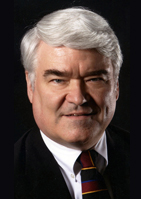© 2013 The Texas Lawbook.
By Nathan Hecht
Contributing Writer to The Texas Lawbook
AUSTIN (September 30) – After 32 years’ judicial service, the past 25 on the Supreme Court of Texas, I am honored and humbled that Governor Perry has appointed me Chief Justice.

Nathan Hecht
In deciding cases, two principles are at the core of the Court’s jurisprudence: statutes, contracts, and other writings must be faithfully interpreted and applied according to their text, and developments in the common law must flow from historical rules in the mainstream of American law.
Both principles derive from an even more basic idea that the proper role of a judge is not to set social policy, which is the prerogative of legislators and the executive, but to resolve disputes according to objective, evenly applied rules. This provides a stability and predictability that is essential to the rule of law.
In addition to deciding cases, the Supreme Court is constitutionally responsible for the efficient administration of the entire judicial branch of government in Texas. Changes in technology and continued growth in Texas’ economy and population make new demands on the legal system. The Court is working to meet these challenges and prepare for future ones.
For several years, the Court has webcast its courtroom proceedings. Oral arguments in cases are available through the Court’s website. Briefs and other materials filed with the Court and other appellate courts are also available on the website. Soon, all materials in all Texas appellate courts will be filed electronically and available on the Internet, making the operation of these courts even more transparent.
The Supreme Court has also directed that over the next two years, all Texas trial courts require electronic filing. This innovation will be historic, ultimately reducing expenses for lawyers and taxpayers and making courts more efficient, while at the same time making all Texas courts even more open. I will work with the Office of Court Administration and local officials to facilitate e-filing throughout the State.
Texas is home to some 1.6 million military veterans, more than any other State except California. Many suffer difficulties and delays in obtaining the benefits we promised them when they put themselves in harm’s way for freedom’s sake. Some, regrettably, face family and financial pressures, and a few find themselves on the wrong side of the law.
The Supreme Court has encouraged legal aid organizations and Texas lawyers to help. The Texas Access to Justice Commission raises money each year for legal aid to veterans. Texas Lawyers for Texas Veterans, a program initiated by the State Bar of Texas and imitated around the country, encourages lawyers to represent veterans free of charge. And specific criminal courts in various areas of the State use legislation intended to treat combat-related causes for law-breaking, not just punish the offender. I will encourage all these efforts.
The Court is tackling pressing problems faced by the elderly and the need to strengthen guardianship monitoring by courts, just as we established a commission to bring together judges, social workers, and educators to solve problems faced by abused and neglected children in court-supervised foster care. These efforts remain priorities.
More than 5.7 million Texans living in poverty qualify for civil legal aid, without which the civil justice system would simply be beyond reach for them. The legal profession has always accepted the obligation to offer representation pro bono publico — for the public good. Each year, Texas lawyers provide millions of hours of free legal services to the poor, worth hundreds of millions of dollars. Legal aid providers also help more than 100,000 Texas families each year, but barely a fourth of those who need assistance. Public funding is a fraction of lawyers’ contributions and serves to help support a system for channeling and augmenting their efforts.
Legal aid is an important way the legal profession serves the public. The civil justice system is where the promises of the rule of law become real. Conservative principles require that access to the civil justice system be afforded to all Texans. Support for basic civil legal services has been a priority for the Supreme Court, one to which its members have long been unanimously committed.
Hard economic times have made it difficult, not just for the poor, but for middle-class families and small businesses to access the legal system when they need it. This year, the Court devised procedures for reducing the expense and time involved in prosecuting and defending claims involving less than $100,000.
These procedures can make it economical for smaller cases to be tried by jury, thus preserving the jury trial as the crown jewel of the justice system. The Court also revamped procedures in the Justice of the Peace Courts to promote efficiency at a savings to parties and taxpayers. The Court will continue to explore ways of improving the court system.
And we will enlist others to help. The Court has encouraged local officials in Texas’ 254 counties to come together to share ideas for improving the court system. This program, called Shared Solutions draws on the talent and experience of leaders statewide to ensure that the judiciary is best serving the people of Texas.
I will continue to search for and promote ways to improve Texas’ justice system as my colleagues and I continue to serve the people of Texas.
The Honorable Nathan Hecht is a justice on the Texas Supreme Court and the state’s next chief justice.
© 2013 The Texas Lawbook. Content of The Texas Lawbook is controlled and protected by specific licensing agreements with our subscribers and under federal copyright laws. Any distribution of this content without the consent of The Texas Lawbook is prohibited.
If you see any inaccuracy in any article in The Texas Lawbook, please contact us. Our goal is content that is 100% true and accurate. Thank you.
